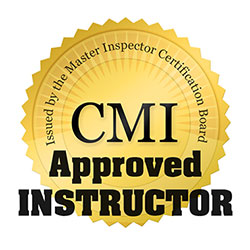Home Inspector Training
Did you ever consider becoming a home inspector?The Nspectr Services offers home inspection training and education for prospective home inspectors that want to not only succeed but become an elite professional. You will learn what works and what pitfalls to avoid while building the knowledge and confidence that will be needed as you grow your business. We will acomplish this with a combination of one on one training sessions, at home study and hands on inspections with a mentor. |
 |
1. No franchise fees and startup costs are minimal.
2. Relatively short term startup training (period may vary dependent on each individuals experience & study ability).
3. A home-based business that offers overhead costs & great tax breaks.
4. Can be conducted as a full or part-time business.
5. Income and potential for expansion is limitless .
6. There is an ever growing demand for home inspection services.
7. Cash flow benefits of onsite payment for services provided.
8. Transportable skills - if you move to another location.
9. Flexibility to set your own hours & days.
10. An important, exciting and lucrative career.
There has never been a stronger demand for home inspections and qualified home inspectors as there will be in the near furture.
This is due, in part, to poor construction practices, cheap materials and lackluster workmanship as well as awareness of environmental concerns and a need to protect today's consumer who is better informed and wants maximum value for what is often the largest financial investment of his/her life, their home..
Some facts and a brief history of Home Inspections in Canada.
1. The Home Inspection profession remains unregulated in most of Canada.
2. In 2009, British Columbia established a licensing requirement and Alberta soon followed.
3. It is obvious that; most provinces will eventually adopt the same attitude. Ontario has started down this path.
4. Which means right now, other than in BC & Alberta, anyone can literally hang out a sign and call himself or herself a home inspector. This has led to an excess of unqualified individuals who have often given their profession a bad name.
5. Home Inspection can also be a very litigious profession and when an inadequately trained inspector advises a client improperly and the client suffers as a result of the misinformation; one can only expect to get sued.
6. The best way for home inspectors to stay out of court is to ensure that they are properly trained and qualified to do the job correctly, which can only be done with appropriate and effective training/mentoring.
7. One of the best ways to become a professional home inspector today in Canada is to find a recognized professional and follow their path to certification and success.
8. Everyone that is considering getting into the profession should clearly understand, that there is no way that 1 course in home inspection will make anyone a home inspector. You require several courses in ALL aspects of home construction including, but not limited to: structural, plumbing, HVAC, electrical, health & safety to name just a few!
9. Anyone thinking that this is a profession to take lightly and where one can easily make a good living without sufficient training should think again!!!
The other item that is worth mentioning here is running your own successful business! This is another area that we can help our new trainees develope the skills they need.
In Canada you should visit the countries leading information source on housing matters - CMHC The Canada Mortgage and Housing Corporation. On their web site there is an excellent publication on "How to Hire a Home Inspector".
Whether you are buying a resale home, or a new home, consider having it inspected by a knowledgeable and professional home inspector. The home inspector’s role is to inform you about the property’s condition observed at the time of the inspection. The home inspector will tell you if something is not working properly, needs to be changed, or is unsafe. He or she will also tell you if repairs are needed, and maybe even where there were problems in the past. A home inspection is a visual inspection. It should include a visual assessment of at least the following: • Foundation • Doors and windows • Roof and exterior walls (except winter) • Attics • Plumbing and electrical systems (where visible) • Heating and air conditioning systems • Ceilings, walls and floors • Insulation (where visible) • Ventilation • The lot, including drainage away from buildings, slopes and natural vegetation • Overall opinion of structural integrity of the buildings • Common areas (in the case of a condominium/strata or co-operative) It’s important to hire a knowledgeable, experienced and competent home inspector. In most areas of Canada, there are no licensing or certification requirements for home inspectors. Anyone can say that they are a home inspector without having taken any courses, passed tests or even inspected houses. So look for a home inspector who belongs to a provincial or industry association holds an accreditation that demonstrates training and experience, provides inspection reports, carries insurance, provides references and has strong experience with the type of home to be inspected. While CMHC does not recommend any individual home inspector or association, CMHC supports a common national occupational standard for home inspectors such as the home inspection industry’s voluntary and independent national certification program.